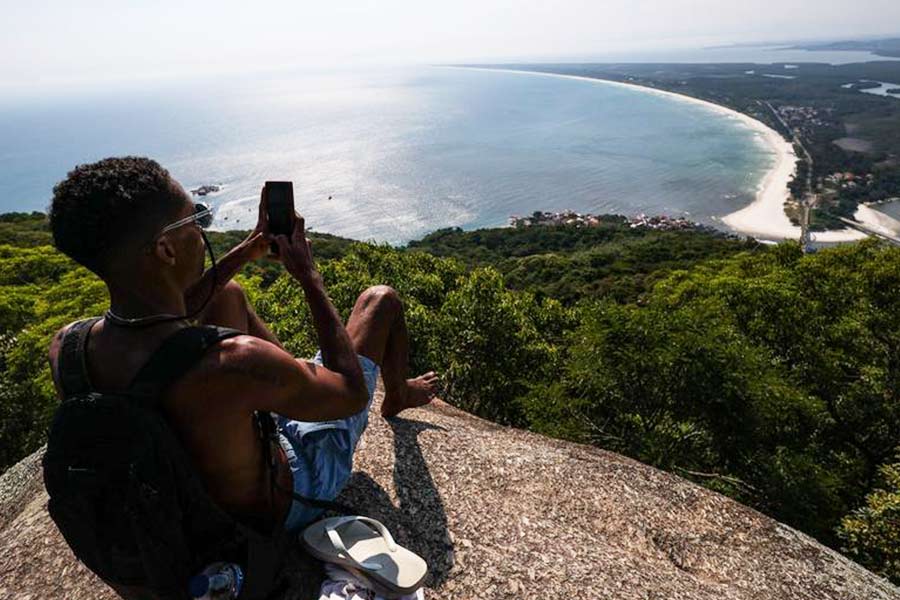A typical tourist online search for information could be something like the following:
"I want to go on a bike tour tomorrow that's a maximum of three hours. Afterwards, I'd like to go for a delicious ice cream.”
Even with search engines like Google, it's not always easy for travelers to get useful tips and suggestions, as results can be outdated or incomplete.
Business opening hours, for example, might not be accurate, explains Michael Prange, Professor of Data Science at the Kiel University of Applied Sciences.
An intelligent travel planner
However, Prange is certain that travel planning will only get easier, in part thanks to artificial intelligence. In the future, tourists can carry their smart travel planner with them wherever they go — in the form of an app on their phone, for example. However, how well such AI recommendation systems work depends on the information they can draw on. "The data is the foundation,” explains Prange.
The German National Tourist Board (GNTB), which markets Germany as an international travel destination, is currently working to create a standardized data set for tourism in Germany.
"Global sales platforms are already using AI to find suitable tourism offers for their customers and present them in a targeted manner,” says Petra Hedorfer, CEO of the GNTB. However, getting access to these offers depends on the correct data.
'AI will influence everything'
Tobias Blask, Professor at the Department of Economics at Harz University of Applied Sciences, also emphasizes the importance of the data that AI applications can draw from.
"This is still a completely underdeveloped area,” he says.
Tourism providers and destinations that want to be noticed, need to make their data available and optimized.
"Everything is developing so rapidly at the moment. AI will influence everything in our society,” he says.
New AI technologies could also have a major impact on how tourists plan their vacations.
Blask envisions a kind of "travel buddy” that makes suggestions based on previous decisions and interactions with users.
"If I plan a trip and can fall back on an AI bot that is trained to understand me, then why would I need a travel agency?”
In the future, business travelers could also benefit from AI applications that take care of everything, from planning and rebooking to billing.
"Suppose I miss the train," says Blask: "It's much nicer if someone else takes care of finding a new connection and proactively tells me about it.”
Chatbots already standard in customer service
AI applications in the tourism industry are by no means new. Hotel chains, booking platforms and airlines, for example, have been long been using systems enriched with machine learning processes for pricing.
Chatbots are often used in customer service at large travel companies before a caller is connected to a human employee.
The same is true at the German National Tourist Board, where chatbots answer customer inquiries. Employees then don't have to carry out what the organization describes as "routine tasks."
"We are currently working on a pilot project to introduce virtual influencers," explains Hedorfer of artificially created figures meant to act as advertising mediums. “With the help of AI applications, these brand ambassadors can build bridges between potential travelers to Germany and real travel experiences.”
AI is also already in use in destination management in many locations, explains Eric Horster, Professor of International Tourism Management at the West Coast University of Applied Sciences and a member of the German Institute for Tourism Research.
In the Bay of Lübeck on Germany's Baltic Sea, for example, beach traffic lights regulate the number of visitors in certain areas that are prone to becoming crowded. Their electronic sensors register the number of beach visitors.
Taking into account the weather and the day of the week, data is analyzed using algorithms to forecast how full the beaches will be in the future. It's not only an advantage for beachgoers, but also for the destinations themselves as they receive important information about vacationers' behavior.
To remove the element of surprise?
However, Horster still doubts that the "smart vacation assistant” in our pockets will fundamentally change the way we travel.
"I'm not entirely sure whether guests really want this,” he says. After all, tourism also thrives on human contact. That's why the good old tourist information office is still holding its own.
Surprises are also part of a travel experience and not everyone wants to have their trip perfectly planned out. After all, travel is also about exploring the unknown — even if it leads you to a closed ice cream shop.










